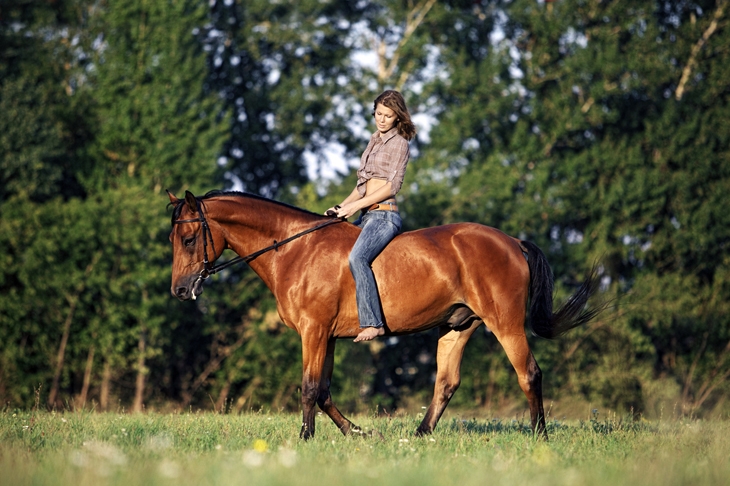Clover Stroud opens her memoir with the crippling bout of post-natal depression that hit after the birth of her fourth child. ‘I felt like a fist. Dash was always naked, plastered bare to my breast, sucking from me as my body dripped milk and tears.’ She even contemplates harming the baby then killing herself, guilelessly telling the health visitor: ‘But isn’t that normal?’ We spiral back in time to the cataclysmic events that spurred Stroud’s distress.
Stroud’s life was idyllic up to the age of 16. Home was a rambling country house in the village of Minety, Wiltshire, filled with adorable siblings and presided over by her father Rick, a TV executive, and her exuberant earth mother Charlotte. Horse-mad from an early age, Stroud was not to know that her keenest passion was to turn into the family curse. At the age of 52, the vibrant Charlotte is thrown from her horse and suffers a catastrophic brain injury. Defying the medical prognosis, she regains consciousness, but is incontinent, barely able to speak and never again becomes the woman they all loved so much, and the mother that the teenage Stroud needed so desperately.
Curiously, this disaster doesn’t put Stroud off horses; on the contrary, their danger, their wildness — the untameable ‘wild other’ of the title — becomes all the more alluring. Even her fourth child’s name, Dash, shortened from Dashiell, was also the name of a much-loved pony. The accident seems to beckon Stroud on to flirt with danger and death, to ride as hard and fast as she can. The book charts a journey that takes her from English racing stables to Texan ranches and on to the most perilous emotional and physical states she can access. At which point, even the intrepid Stroud realises she has reached her limit.
Memoir always seems an unstable genre, slippery and ambiguous. Who can really recall the details of conversations from long ago? Who can remember verbatim the precise escalation of a drunken argument? By the time we get to Texas, the impression of fictionality intensifies; everyone seems to talk like a character from Dallas, one of Charlotte’s favourite shows. ‘Hey, y’all, you ready for this?… Damn coyotes… they’d eat a calf right out of its momma as it’s being born.’
This is not to disrespect or disbelieve Stroud’s account (the acknowledgements refer to the notebooks and diaries she kept along the way), merely to note the narrative strategies used to convey the emotional truths of the past. Stroud’s life is certainly eventful. A fascination with music, drugs, gypsies and travellers leads her across England and Ireland in search of outlaw communities and raves (it’s the 1990s). Drawn to rootless men with horses, she tumbles into successive beds and bunks, breaks off for a stint at Oxford University during which she seems utterly bemused, and finally marries a charismatic Irish musician who turns out to be a heavy drinker and something of a fake Paddy.
All the while, Stroud’s crazy is mirrored by her mother’s immobility, almost as though she is living for two, or raging mutely: ‘You see what happens when you desert your child?’ For as she acknowledges, as well as feeling love, anguish and pity, Stroud nurses a fierce anger towards Charlotte. The accident means that Stroud remains 16, locked into a rebellious pose she should have long outgrown.
It’s a little odd, moving chronologically, to reach the point where we started and find the post-natal depression passed by as though it was a blip. I’m sure it was perfectly real; Stroud’s honesty as a writer is blistering. It’s just that treating the depression this way relegates it to a literary device. Another jolting omission is the abrupt dismissal of Stroud’s first marriage: ‘we are friends now, and neither Dan nor I have looked back.’ You suspect Dan is not entirely on board with this project.
The spine of the book is formed by Stroud’s beloved Ridgeway, the prehistoric hillside track running from Wiltshire to Bucks by which she lives. Its ancient monuments, the White Horse of Uffington and Wayland’s Smithy, are Stroud’s touchstones of a higher reality. Such glimpses of a particularly English spirituality, aligned with the power and otherness of non-human companionship, elevate her memoir. Some events can’t be mitigated; they can only be endured with grace and style, something Stroud certainly achieves, to judge from this marvellous book.






Comments